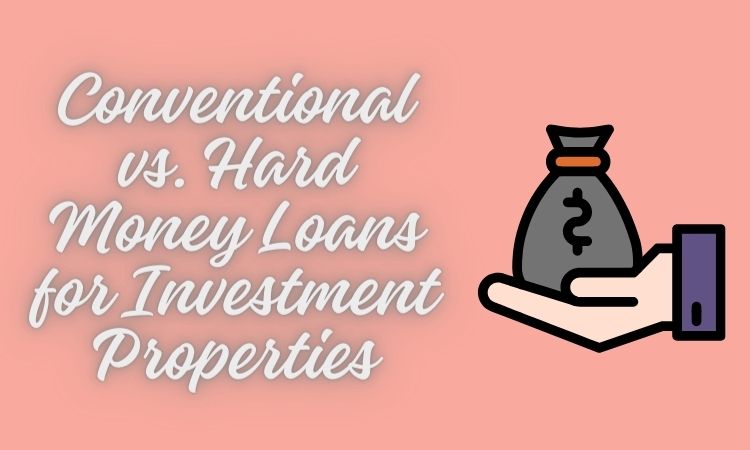The thrill of real estate investment beckons, promising a path to financial security and passive income. But before you dive headfirst into the world of rentals and flips, securing the right financing is paramount. Two prominent options often emerge – the familiar comfort of conventional loans and the swift action of hard money loans. This comprehensive guide will dissect both, empowering you to make an informed decision that aligns with your investment strategy.
Understanding Conventional Loans: Stability for the Long Haul
Conventional loans, backed by private lenders but conforming to Fannie Mae and Freddie Mac standards, offer a time-tested solution for investment properties. They are known for:
- Competitive Rates: With good credit scores, you can secure attractive interest rates, making your investment more profitable in the long run.
- Longer Repayment Terms: Conventional loans typically offer 15 or 30-year repayment periods, providing manageable monthly payments and allowing you to build equity steadily.
- Predictability: Fixed interest rates ensure your monthly payments remain consistent throughout the loan term, facilitating budgeting and financial planning.
- Lower Down Payments: Compared to hard money loans, conventional loans generally require a down payment of 20% or less, making them more accessible to a wider pool of investors.
However, conventional loans also come with some drawbacks:
- Stricter Qualification Process: Lenders meticulously examine your credit score, income, and debt-to-income ratio (DTI) to assess your ability to repay. A less-than-stellar credit history or high DTI can result in loan denial or unfavorable terms.
- Slower Closing Times: The loan approval process typically takes several weeks, as lenders thoroughly verify your financial standing. This can be a disadvantage if you need to move quickly on a promising investment opportunity.
- Property Limitations: Conventional loans often have restrictions on the type of property you can finance. For example, some lenders might not finance fixer-uppers requiring significant renovations.
Hard Money Loans: Geared for Speed and Flexibility
Hard money loans, provided by private lenders or hard money lenders, offer an alternative path for investment property financing. They are known for:
- Fast Closings: Hard money lenders prioritize speed and can close loans within a week or two. This agility is crucial for investors seeking to capitalize on time-sensitive deals.
- Flexible Qualification Requirements: Credit score and DTI hold less weight compared to conventional loans. The primary focus is on the property’s value and your exit strategy (how you plan to repay the loan).
- Financing for Non-Traditional Properties: Hard money loans can be used to finance fixer-uppers, investment properties in disrepair, or properties with unique features that might not meet conventional loan requirements.
However, the benefits of hard money loans come at a cost:
- Higher Interest Rates: Be prepared for significantly higher interest rates than conventional loans. Hard money lenders compensate for the increased risk and faster processing by charging a premium.
- Shorter Repayment Terms: Hard money loans typically have shorter repayment terms, ranging from a few months to a few years. This can put pressure on your cash flow and limit your ability to hold onto the property for the long term.
- Higher Closing Costs: Origination fees, application fees, and other closing costs associated with hard money loans can be substantially higher than conventional loans, further impacting your overall investment return.
Choosing the Right Loan: Aligning with Your Investment Strategy
The ideal loan hinges on your specific investment goals:
Long-Term Rentals: If you plan to hold onto a property for rental income and build equity over time, a conventional loan is likely the better choice. The lower interest rates and longer repayment terms will translate to a more manageable and potentially more profitable investment.
Fix-and-Flip Properties: Fast closings and flexible underwriting make hard money loans well-suited for fix-and-flip scenarios. However, factor in the higher interest rates and shorter terms when calculating your potential return on investment (ROI).
Building a Portfolio: As your investment portfolio grows, portfolio loans, which bundle financing for multiple properties under one umbrella, can simplify management and potentially offer competitive rates. However, these loans are typically reserved for experienced investors with a proven track record.
Beyond the Basics: Additional Considerations
- Experience Level: For first-time investors, the stability and predictability of conventional loans might be more comfortable. Hard money loans can be riskier and are best suited for experienced investors who understand the fast-paced nature and higher costs involved.
- Property Condition: If the property requires significant renovations, a hard money loan might be the only option as conventional loans often have limitations on financing fixer-uppers.
- Market Conditions: In a competitive market where speed is of the essence, a hard money loan can help you secure a property before it disappears. However, during buyer’s markets, the flexibility of conventional loans allows you to negotiate more favorable terms without the pressure of short deadlines.
Pro Tips for Securing Your Investment Loan
- Boost Your Credit Score: Regardless of the loan type, a strong credit score will improve your chances of securing a favorable interest rate and terms.
- Save for a Down Payment: A larger down payment reduces the loan amount and demonstrates your financial commitment to the investment. This can be advantageous when applying for either type of loan.
- Prepare Your Financials: Organize your income statements, tax returns, and asset verification documents to streamline the loan application process.
- Compare Rates and Terms: Don’t settle for the first offer. Shop around and gather quotes from multiple lenders to secure the most competitive deal.
- Consider a Mortgage Broker: A qualified mortgage broker can guide you through the loan application process and recommend the best option for your needs.
Conclusion: Investing in Your Knowledge Pays Off
The world of investment property financing can seem daunting. However, by understanding the strengths and weaknesses of conventional and hard money loans, and by carefully considering your investment strategy and risk tolerance, you can make an informed decision that empowers your real estate journey. Remember, a significant part of successful investing lies in preparation and knowledge. Equip yourself with the right tools and resources, and you’ll be well on your way to unlocking the exciting possibilities of the real estate market.
Read more related articles here.



